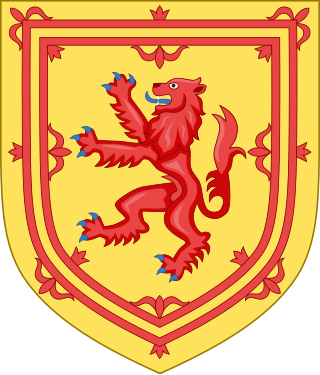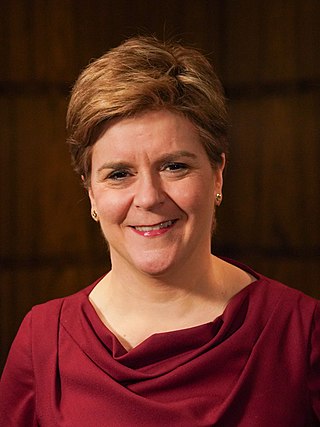
Local government in Scotland comprises thirty-two local authorities, commonly referred to as councils. Each council provides public services, including education, social care, waste management, libraries and planning. Councils receive the majority of their funding from the Scottish Government, but operate independently and are accountable to their local electorates. Councils raise additional income via the Council Tax, a locally variable domestic property tax, and Business rates, a non-domestic property tax.

Lieutenancy areas are the separate areas of the United Kingdom appointed a lord-lieutenant – a representative of the British monarch. In many cases they have similar demarcation and naming to, but are not necessarily coterminate with, the counties of the United Kingdom.

The Local Government etc. (Scotland) Act 1994 is an Act of the Parliament of the United Kingdom that created the current local government structure of 32 unitary authorities covering the whole of Scotland.

Strathclyde Police was the territorial police force responsible for the Scottish council areas of Argyll and Bute, City of Glasgow, East Ayrshire, East Dunbartonshire, East Renfrewshire, Inverclyde, North Ayrshire, North Lanarkshire, Renfrewshire, South Ayrshire, South Lanarkshire and West Dunbartonshire between 1975 and 2013. The Police Authority contained members from each of these authorities.

The Bishops' Conference of Scotland (BCOS), under the trust of the Catholic National Endowment Trust, and based in Airdrie, North Lanarkshire, is an episcopal conference for archbishops and bishops of the Roman Catholic Church in Scotland. The conference is primarily made up of the presiding bishops of Scotland's eight dioceses as well as bishops who have retired.
Community Health Partnerships, known as CHPs were subdivisions of Health Boards in Scotland, from 2005 to 2015, after which their functions were fully taken over by Health and Social Care Partnerships in April 2015.

Voluntary Service Aberdeen (VSA) Since the charity was first established in 1870, Aberdeen Association of Social Services has helped thousands of the most vulnerable people and their families living in communities across the North East of Scotland. The charity now led by Dr. Kenneth Simpson, BA BSc MPA (Hon) DBA CMgr FCMI FIoD FRSA, today provides vital support and services to people of all ages across four core areas: Children and Families, Adult and Community, Education and Learning, and Carers Support. VSA support a person's physical, mental, emotional and social wellbeing through a range of residential and outreach support services. VSA employs over 500 staff and has a turnover of over £15 million. Formed in 1870, VSA is one of the oldest social care charities in Scotland. The charity is made up of the merger of seven local charities over the previous century.
Scouting in Scotland is largely represented by Scouts Scotland, a registered Scottish Charity No. SC017511 that is affiliated to the Scout Association of the United Kingdom. The Baden-Powell Scouts' Association also has a presence in Scotland.
Quarriers is a Scottish social care charity based in Quarrier's Village, Inverclyde. It provides care and support for people with a disability, children and families, young people, young homeless people, people with epilepsy and carers. In February 2008 Quarriers was the largest non-church social care charity in Scotland.

The 2003 Scottish local elections were held on 1 May 2003, the same day as Scottish Parliament elections and local elections in parts of England. All 32 Scottish councils had all their seats up for election – all Scottish councils are unitary authorities.

Children’s Hospices Across Scotland (CHAS), formally known as Children's Hospice Association Scotland, is a registered charity that provides the country's only hospice services for children and young people with life-shortening conditions. The first hospice was built thanks to the late editor-in chief of the Daily Record and Sunday Mail, Endell Laird, who launched a reader appeal which raised £4million. CHAS offers children’s hospice services, free of charge, to every child, young person and their families who needs and wants them. CHAS was formed in February 1992 by a group of professionals and parents of children with life-shortening conditions who had travelled to England for hospice care. In 2018/19, CHAS supported 465 children with a life-shortening condition, and their siblings, parents and wider families. The care provided is multi-disciplinary, including from doctors, nurses, social workers, pharmacists, play specialists and others. CHAS also employs medical and nursing staff who work in hospitals alongside NHS doctors and nurses.
This is a list of listed buildings in Scotland. The list is split out by council area.
Sense Scotland is a national charity and specialised social care provider in Scotland, formalized in 1985. The charity’s aim is to support people with communication support needs associated with complex and sensory disabilities, and their families, and put their individual needs and choices first. Services are located all over Scotland with the charity’s main resource centre and head office based in Glasgow. The charity also provides information about complex communication support needs and participates in disability rights campaigns. Sense Scotland’s work is mainly funded by Local Government through contracts for services provided. It also raises money through donations, legacies, community fundraising, events, retail and corporate partnerships.
The Garvald Centres are a group of six affiliated but independent Scottish charities that support people with special needs and learning disabilities. It is based on the work of the Austrian esotericist Rudolf Steiner. The charities operate in the Midlothian, Scottish Borders and Edinburgh area of Scotland.
Health and Social Care Partnerships, (HSCPs) are organisations formed to integrate services provided by Health Boards and Councils in Scotland. Each partnership is jointly run by the NHS and local authority. There are 31 HSCPs across Scotland. These are statutory bodies, which took over responsibilities from Community Health Partnerships. They are responsible for £8.5 billion of funding for local services.

The 2022 Scottish local elections were held on 5 May 2022, as part of the 2022 United Kingdom local elections. All 1,227 seats across all 32 Scottish local authorities were up for election and voter turnout was 44.8%.









